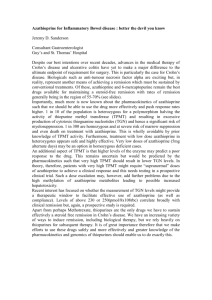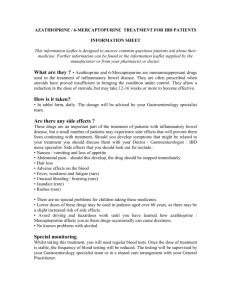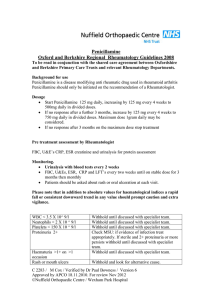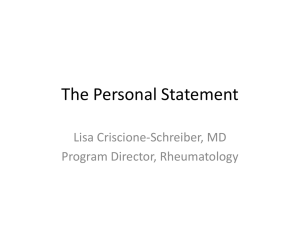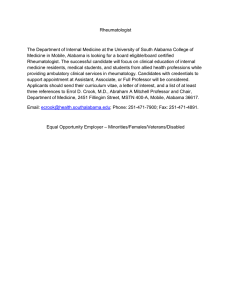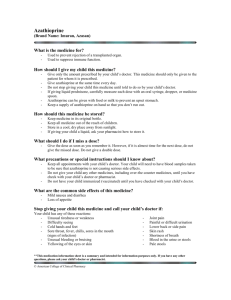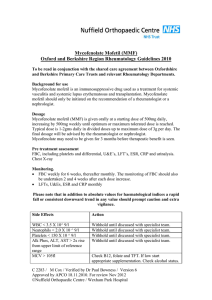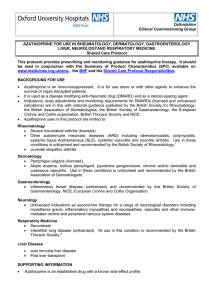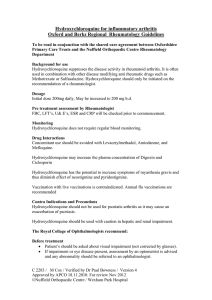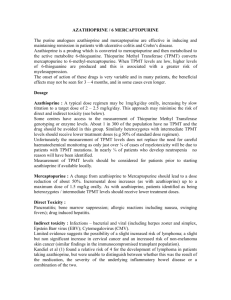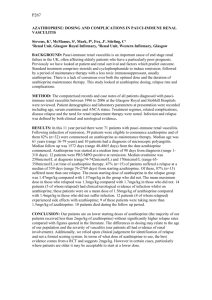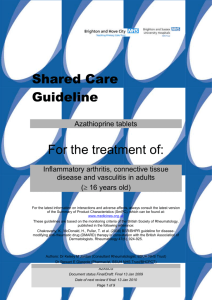Azathioprine Oxford and Berkshire Regional Rheumatology Guidelines 2010
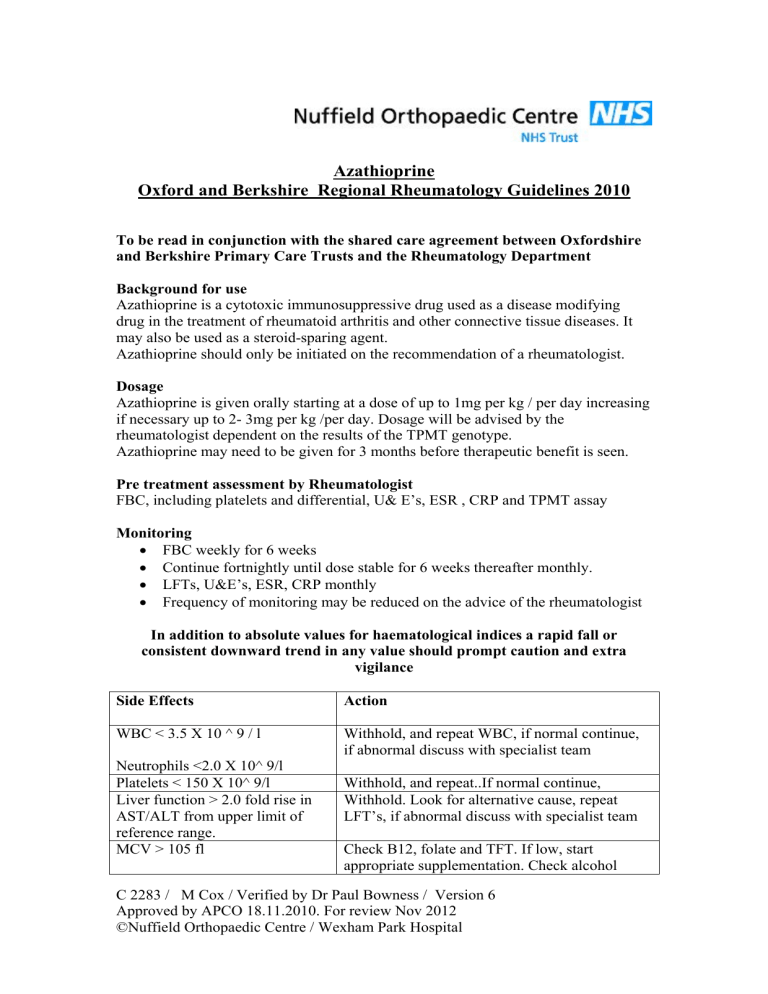
Azathioprine
Oxford and Berkshire Regional Rheumatology Guidelines 2010
To be read in conjunction with the shared care agreement between Oxfordshire and Berkshire Primary Care Trusts and the Rheumatology Department
Background for use
Azathioprine is a cytotoxic immunosuppressive drug used as a disease modifying drug in the treatment of rheumatoid arthritis and other connective tissue diseases. It may also be used as a steroid-sparing agent.
Azathioprine should only be initiated on the recommendation of a rheumatologist.
Dosage
Azathioprine is given orally starting at a dose of up to 1mg per kg / per day increasing if necessary up to 2- 3mg per kg /per day. Dosage will be advised by the rheumatologist dependent on the results of the TPMT genotype.
Azathioprine may need to be given for 3 months before therapeutic benefit is seen.
Pre treatment assessment by Rheumatologist
FBC, including platelets and differential, U& E’s, ESR , CRP and TPMT assay
Monitoring
FBC weekly for 6 weeks
Continue fortnightly until dose stable for 6 weeks thereafter monthly.
LFTs, U&E’s, ESR, CRP monthly
Frequency of monitoring may be reduced on the advice of the rheumatologist
In addition to absolute values for haematological indices a rapid fall or consistent downward trend in any value should prompt caution and extra vigilance
Side Effects
WBC < 3.5 X 10 ^ 9 / l
Action
Withhold, and repeat WBC, if normal continue, if abnormal discuss with specialist team
Neutrophils <2.0 X 10^ 9/l
Platelets < 150 X 10^ 9/l Withhold, and repeat..If normal continue,
Liver function > 2.0 fold rise in
AST/ALT from upper limit of reference range.
MCV > 105 fl
Withhold. Look for alternative cause, repeat
LFT’s, if abnormal discuss with specialist team
Check B12, folate and TFT. If low, start appropriate supplementation. Check alcohol
C 2283 / M Cox / Verified by Dr Paul Bowness / Version 6
Approved by APCO 18.11.2010. For review Nov 2012
©Nuffield Orthopaedic Centre / Wexham Park Hospital
Rash or oral ulceration status.
Withhold until symptoms clear. Consider rechallenging at a lower dose. If rash recurs stop azathioprine and discuss with specialist team.
Hypersensitivity reactions
Treat oral ulceration.
Fever, malaise, rash, vomiting, muscle/bone pain, dizziness. Stop azathioprine.
Abnormal bruising or sore throat Withhold until FBC result available
Nausea, vomiting, diarrhoea
Note:
Azathioprine can be withheld for several days without causing a flare.
Annual ‘flu vaccination is recommended
Contraindications and Precautions
TPMT assay
Administer tablets after meals to reduce nausea.
An anti-emetic or dose reduction may help. If symptoms persist stop azathioprine.
Provides information of risks related to treatment.
Both homozygous and heterozygous deficiency are associated with serious and fatal toxicity
Immunization with LIVE vaccines
Chicken pox /Shingles
Pregnancy and breast feeding
Patients receiving azothioprine must NOT receive immunization with LIVE vaccines.
Inactivated polio is available although suboptimal response may be seen.
Patients suffering from chickenpox or active skin lesions in shingles; withhold azothioprine and inform rheumatologist
Exposure to chickenpox or shingles; passive immunization should be carried out using VZIG
Effective contraception is advised. However there may be some circumstances where the benefits of continuing treatment outway the possible risks to the unborn child
Breast feeding should be avoided.
Notable Drug Interactions (refer to BNF and SPC)
Allopurinol: Dose of azathioprine must be reduced to 25% of original dose.
Warfarin: azathioprine inhibits the anti-coagulant effect of warfarin
Phenytoin/sodium valproate/carbamezapine: azathioprine reduces the absorption of these drugs
ACE inhibitors: co-prescription may cause anaemia
Aminosalicilates: co-prescription may contribute to bone marrow toxicity
Co-trimomazole /Trimethoprim: can cause life threatening haemotoxicity
NSAIDs may be continued
C 2283 / M Cox / Verified by Dr Paul Bowness / Version 6
Approved by APCO 18.11.2010. For review Nov 2012
©Nuffield Orthopaedic Centre / Wexham Park Hospital
Contact Telephone Numbers
Nuffield Orthopaedic Centre.
Rheumatology Registrar on call
Rheumatology Advice line (Answer phone)
01865 741155
Bleep Rheumatology Registrar on call
01865 737656
01865 737657 Clinical Nurse Specialist in rheumatology
Copies of all these sheets are available for general use by GP’s via the unit or electronically on NOC website or PCT Intranet (nww.oxfordshirepct.nhs.uk under
General Practice / Prescribing and Medicines Management / Shared Care Protocols)
C 2283 / M Cox / Verified by Dr Paul Bowness / Version 6
Approved by APCO 18.11.2010. For review Nov 2012
©Nuffield Orthopaedic Centre / Wexham Park Hospital
